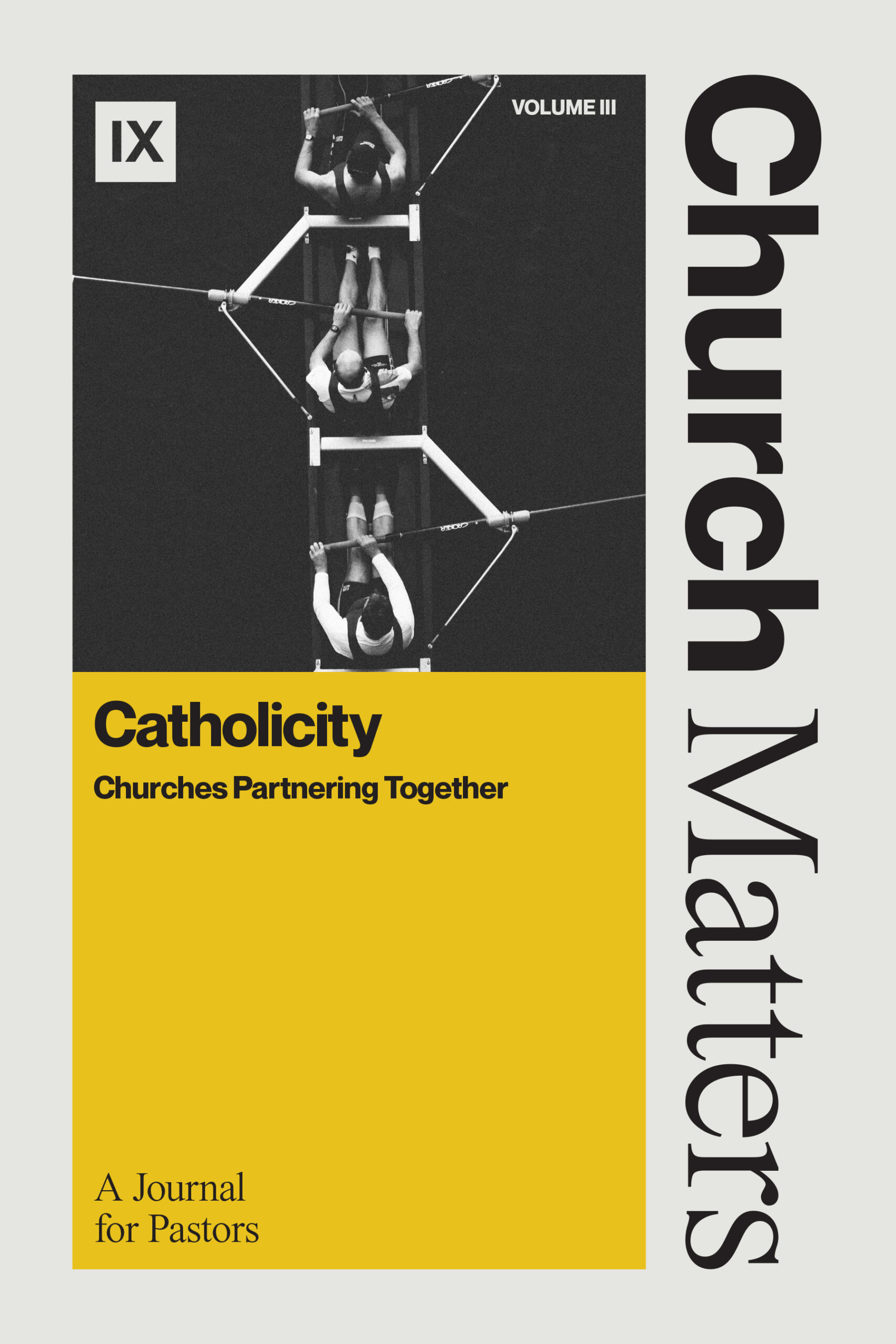Ecclesiological Triage
Once upon a time, the main divisions among evangelical churches were either denominational or stylistic. Denominationally, some of us baptize babies and some of us don’t, some of us speak in tongues and some of us don’t. Stylistically, some of us sing hymns, some of us rarely do. Some of us serve third-wave coffee, some of us have no idea what that is. So when it came to cooperation between evangelical churches, the barriers were either significant and objectively clear or trivial and largely subjective.
But those days are long behind us. Over the past decade, evangelical churches have splintered into a plethora of tribes that cut across denominational lines and ministry styles. Our age is polarized, and now political allegiances, views on social engagement, and increasing theological diversity divide us, too, making the question of cooperation with other churches even more complex.
To make matters worse, church members will regard our decisions to cooperate or not as statements of identity, of taking sides and drawing lines between “our people” and “not our people.” They won’t see such decisions as careful, prudential judgments intended to best facilitate Great Commission cooperation. Rather, signing or not signing a joint public statement or participating or not in a city-wide prayer meeting will be interpreted through partisan lenses, adding fuel to the already-burning political fires.
In the same spirit as my earlier article on complementarianism and theological triage, I’d like to try and bring light rather than heat to the question of cooperation between churches in these polarized times. How do we decide when and to what extent to cooperate with churches that are more or less like-minded? Can a conservative church cooperate with an affirming church? Can a church that leans Christian-nationalist ever work with a church that leans toward the separating “Benedict Option”?
Recently, pastors have done the work of theological triage by dividing doctrines into first, second, or third tiers. Historically, they’ve triaged by asking whether a position was Christian or not, orthodox or not, evangelical or not, and confessional or not. Yet many of the questions facing pastors today are ethical and political in nature, dividing people in ways that don’t exactly map over the older distinctions. Now, a church might espouse evangelical positions and practices in everything except in their stance on LGBTQ, in which they adopt an “affirming” position. Or, a church might share denominational and theological distinctives with your own, but also elevate political and social priorities to identity-defining levels. Such churches become known as much or more for their Christian nationalism (or opposition to it), their position on CRT, or the latest election than as they are known for their evangelical beliefs.
Therefore, we need a couple of working categories beyond Christian, orthodox, evangelical, and confessional. I propose that we add sectarian vs. catholic and faithful vs. accommodating.
Sectarian or Catholic?
A sect is a faction or party. Among Christians, the term can refer either to a dissenting or heretical group or to any otherwise orthodox group that has elevated its distinctives to the point of denigrating more important matters. A sect turns secondary commitments into primary ones or tertiary into secondary.
By definition, however, historic evangelicalism is catholic or non-sectarian. Despite secondary differences, it unites around a shared understanding of Scripture’s authority and the gospel’s message of justification by faith alone. Michael Reeves observes in Gospel People: A Call for Evangelical Integrity, evangelical “fellowship does not require comprehensive agreement on secondary and tertiary issues. . . With fellow evangelicals, we expect and seek to express the deepest unity of heart and mind, but we don’t imagine that means we all could be members of the same denomination or organization” (pp. 102-103).
Similarly, Kenneth Collins and Jerry Walls have written, “Evangelical Protestantism, with all its denominational diversity, actually represents a far more impressive model of true unity than does the Church of Rome. . . Despite their differences on secondary issues, there is genuine agreement and substantial unity on classic orthodox catholic doctrine” (quoted in Michael Reeves, Gospel People, p. 100)
Some evangelical churches today have become, or are in danger of becoming, sectarian. While there have always been fundamentalists who won’t cooperate with anyone else, today’s sectarians are increasingly defined not by polity but by politics and culture war. The price of cooperating with such churches is often the adoption of, or at least acquiescence to, their political positions or public agreement with their statements on race, social justice, public schools, recent elections, or a host of other issues. And make no mistake, this is happening on the political right and left.
JC Ryle, on the other hand, advised churches to “keep the walls of separation as low as possible, and shake hands over them as often as you can” (quoted in Reeves, p. 103). That’s good biblical advice, and we should apply it to our sectarian instincts as much as possible. We’re never at liberty to make something primary that is not. Nor should we alienate evangelicals with whom we share the gospel in order to cooperate with the sectarians who make non-essential beliefs the litmus test for evangelical fellowship. While this doesn’t mean we should never cooperate with sectarian churches, it may mean that we cooperate at a lower level than we previously did. Again, full cooperation comes at the cost of acquiescing to their sectarian litmus test of fellowship.
Faithful or Accommodating?
A second category to consider is that of faithful vs. accommodating churches. In my previous article, I suggested that egalitarianism could be counted as a second or third tier issue, depending on the context. But when considering cooperation with an “evangelical” egalitarian church, we must acknowledge that not all egalitarians are the same. When I was a seminarian in the 1990s, the debate between evangelical egalitarians and complementarians was a debate over what our commonly received authority, the Bible, actually said. Evangelical egalitarians recognized Scriptural authority, which marked them out from their mainline counterparts.
These types of evangelical egalitarians still exist, but a new kind of egalitarian has also appeared. Churches in my own city of Portland, Oregon, at least, appear to have adopted egalitarian positions out of a sense of evangelistic or apologetic necessity. Over the last decade, almost all of the larger, attractional evangelical churches in my area have changed their position on women serving as pastors and preaching on Sundays. Is it only coincidence that this shift coincided with our culture’s shift on same-sex marriage and the mainstreaming of LGBTQ identity? I cannot read hearts, but their posture at least appears to be driven less by the desire to get the Bible right and more by feeling the need to accommodate culture.
Even more concerning, in the last few years some of those same churches have gone quiet on the issue of same-sex marriage and the call to repentance from gay and lesbian identities.
I’m sympathetic to their dilemma. When your model is attractional, there’s a limit to how much discontinuity you can tolerate between your church and your culture before your model ceases to work. What’s more, many pastors or church leaders have had friends or family members who’ve come out as gay or trans. It’s difficult to stand firm in the gospel, including both biblical authority and the call to repentance, when that stand will be interpreted as unloving toward those whom we love deeply.
But the New Testament is clear. We are called to “stand firm” together in the gospel. This is Paul’s exhortation to the Corinthians (1 Cor. 15:58; 16:13), the Ephesians (Eph. 6:13-14), and the Philippians (Phil. 1:27). It’s Jude’s reason for writing (Jude 3) and the author to Hebrews‘ repeated concern (Heb. 3:7-15; 6:1-12; 10:26-39; 12:1-2). As Reeves has so helpfully outlined, that gospel is a Trinitarian gospel that includes the Father’s authoritative revelation and the Spirit’s regenerating work. Sadly, it is possible to preach that Christ saves sinners through his sacrificial death on the cross and resurrection from the dead, and yet not stand firm in the evangelical “faith that was delivered to the saints once for all” (Jude 3).
Not every church that calls itself evangelical is true to the name. Just as dangerous as the wrongful elevation of non-essential issues is the “treachery that gives up the essential truths of the faith” (Reeves, p. 114), even, or especially, when it’s done for the sake of something as important as evangelism. To downplay Scripture’s authority or to neglect the call to repentance is to preach a different gospel. When robust evangelical unity is lacking, our ability to partner and cooperate will be limited as well, not so much out of concern for our own purity, but out of concern for gospel clarity.
Declaration and Demonstration
At the end of the day, the question of cooperation between churches cannot escape the need for wisdom and discernment. As evangelicals, we want to uphold the catholicity of the gospel. That catholicity demonstrates the truth of who Jesus is and what he came to do (John 17:20-23). The closer we get to the work of evangelism and planting churches, the more agreement will be required.
Declaring the gospel requires agreement on the gospel. But for the sake of the gospel unity which Jesus has already established, we want to remember that not every truth requires separation and not every distinctive prevents cooperation. Where our agreement is thick, so should our cooperation be. Where it is thin, our cooperation will reflect the same. But wherever possible, and to whatever extent possible, we want to cooperate with other churches for the sake of the gospel—its declaration and its demonstration.
Related Multimedia

How to Use Prayer Meetings to Promote Catholicity
By Ben Lacey









